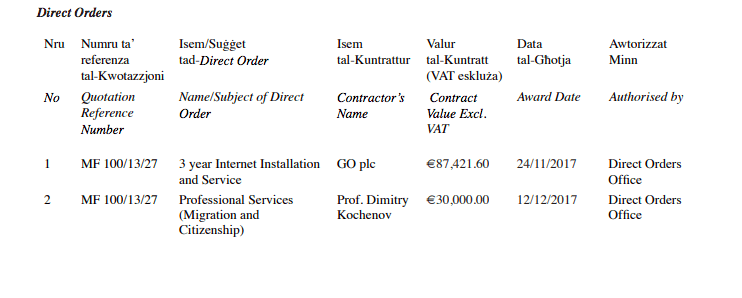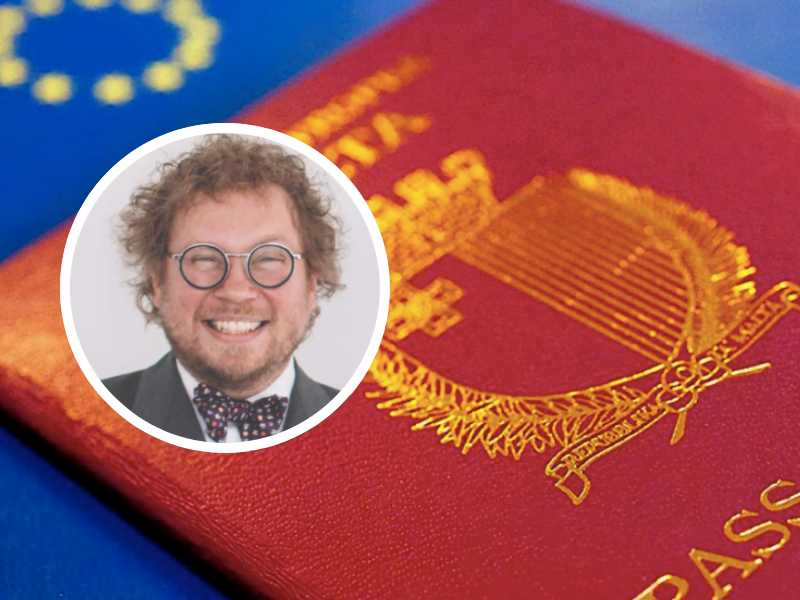A Dutch law professor has been reprimanded by the University of Groningen for failing to declare his role as an advisor to the Maltese government on its golden passport scheme, according to Dutch media.
Dimitry Kochenov’s paid advisory role to Malta when it “changed its rules to allow non-nationals to acquire citizenship by investing around €1 million in property, stocks and shares and a national development fund”, was deemed a conflict of interest by investigators, Dutch News reported on Tuesday.
In a 2019 Dutch documentary titled Passport Trade: Wealthy Foreigners Buy Citizenship in Malta, Kochenov was reported to have “participated in a Maltese delegation that defended the position on trade in passports against the European Commission with a mandate from the Maltese government”.
Dubbed the Passport Professor, besides acting as a consultant to the Maltese government, Kochenov created the Henley & Partners – Kochenov Quality of Nationality Index (QNI) that ranks the quality of nationalities around the world. He is also listed on their website as a speaker.
A professor of EU Constitutional Law and Citizenship at the University of Groningen, Kochenov was also Chairman of the Investment Migration Council (IMC) in Geneva, the citizenship by investment industry’s association. When The Shift visited its headquarters in Geneva, there was no sign of the association’s presence.
An investigating committee found that Kochenov’s conflict of interest resulted in a breach of regulations, as he failed to report the role to his employer when he should have been aware of its “politically sensitive nature,” the report said.
“The law has been attacked for giving international billionaires a route to EU citizenship without any checks on the source of their wealth. A European Parliament delegation said in 2017 that the island risked ‘importing criminals and money laundering into the whole EU”, the report recalled.
Kochenov also received one direct order worth €30,000 in 2017. It is not yet clear whether he received others due to the frequent failure of government ministries to publish complete lists of public procurement within the six months’ time frame.

A €30,000 direct order issued to Kochenov. Source: Government Gazette
In October, The Shift reported that five new Maltese citizens had been charged with criminal offences within a 12-month period. A few months later in April, a report by international anti-corruption NGO Global Witness slammed the response by Identity Malta on shady passport clients as “weak”.
The golden passport scheme has also been highly criticised by the EU as EU Justice Commissioner Věra Jourová said in 2019 that the European Commission did “not endorse this system”.
Referring to Kochenov’s role, the Dutch security service AIVD also told Dutch current affairs television program Niewsuur that the development was ‘troubling from the point of national security’.
“Maltese journalist Daphne Caruana Galizia was killed by a car bomb in 2017 while investigating corruption on the island, including the sale of passports to Russian businessmen,” it said.
Special Rapporteur Pieter Omtzigt, who had previously raised the issue of the Maltese passport scheme to the European Commission, said that he was glad that ‘measures are being taken and the RUG is putting things right’.
“The AIVD (Dutch security service) views the trade-in passports as undesirable from the point of view of national security. It’s good that professor Kochenov has finally put an end to his clandestine extracurricular work as an advisor,” Omtzigt said.
After Kochenov’s advisory role was revealed by Niewsuur, the professor gave it up.
Culture minister Ingrid van Engelshoven submitted the report to parliament on Monday with a note stating the inspectors had found a conflict of interest with Kochenov’s position as chair in European Constitutional Law and Citizenship.
The minister agreed with inspectors that Kochenov should repay any money that he had earned from Malta, but it remains unclear if this is enforceable in Dutch law, according to the report.












